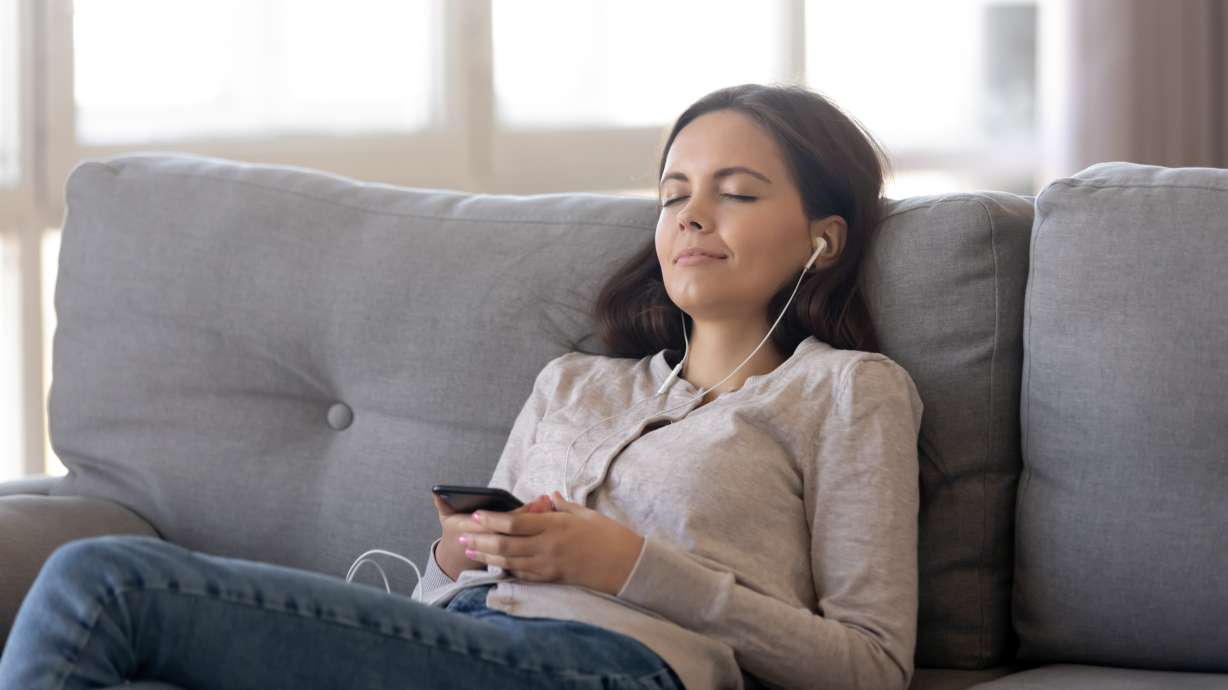Estimated read time: 4-5 minutes
This archived news story is available only for your personal, non-commercial use. Information in the story may be outdated or superseded by additional information. Reading or replaying the story in its archived form does not constitute a republication of the story.
SALT LAKE CITY — There has been a significant uptick in nationwide searches for peace, meditation and, yes, even a rise in "good news" searches since the COVID-19 pandemic led to mass shutdowns across the globe, Google Trends reports. In fact, the report shows the number of people searching meditation has reached an all-time high since Google began keeping tabs on search frequency in 2004.
As a result of such searches, people are turning to their phones and toward the hundreds of guided meditation apps you can find at your fingertips. But are these apps actually helpful?
In a short answer: sort of. This is a question researchers have only looked into relatively recently, but they dove into it well before the pandemic began.
For example, in 2017, a group of researchers from a handful of U.S. universities conducted a study that found that a two-week mindfulness training app could change a person’s biological response to stress. Researchers found that those who had learned mindfulness and acceptance of their surroundings reported lower cortisol levels — typically an indicator of stress or anxiousness — compared to those they tested who used only mindfulness skill of monitoring or coping skills.
"This study contributes evidence to an ongoing debate about the importance of acceptance in contemporary mindfulness training interventions," researchers wrote. "By comparing mindfulness interventions that include or exclude an acceptance training component, this study shows that learning to accept one’s experiences produces measurable biological stress reduction effects."
The following year, researchers from Lancaster University in the United Kingdom looked into 16 of the most popular mindfulness apps, such as Breethe, Calm, Headspace and The Mindfulness App.
In the study, they found that apps recommend 10 minutes of daily practice and offer ways to keep track of practice sessions, but all 16 had "limited support for monitoring the intrinsic meditation processes or for measuring the effectiveness of the training." Essentially, they found none of the apps really helped indicate if it was actually working.
Dr. James Cartreine, an instructor in psychiatry at Harvard Medical School tackled this question in 2018, as well. He pointed out that the importance of mindfulness is "noticing what is going on around you, and what is going on inside you." Therefore, he said, it’s important to find apps that help in this way.
Whatever you try, mindfulness training is considered very safe and has a good chance of increasing your happiness and peacefulness and reducing your depression, anxiety and stress.
–Dr. James Cartreine, psychiatry professor at Harvard Medical School
"It’s hard to notice what’s going on inside or around you if you’re distracted by someone speaking, even if it is soothing speech, and some reviews of these apps point this out. Research also indicates that the self-directed, silent form of mindfulness practice is more effective than externally guided exercises," he wrote.
"Being talked through a breathing exercise is actually a form of relaxation training (learning to release tension from the body), which also has value, but is different from mindfulness training."
That’s not to say these apps are pointless. You just need to find the best for you and take time to practice each day, he concluded.
"Whatever you try, mindfulness training is considered very safe and has a good chance of increasing your happiness and peacefulness and reducing your depression, anxiety and stress," he wrote.
So what are some good mindfulness apps to consider during this stressful time in history? Here are a few of the higher-rated apps available for download, listed in alphabetical order:
Breethe
Apple rating: 4.7/5 stars
Google Play rating: 4.2/5 stars
Note: Free + in-app purchases.
Calm
Apple rating: 4.8/5 stars
Google Play rating: 4.4/5 stars
Note: Free + in-app purchases. Apple states this was the third-most popular app among health and fitness options, as of Monday; Google Play states it was the top free and top-grossing app in that same category.
Headspace
Apple rating: 4.9/5 stars
Google Play rating: 3.5/5 stars
Note: Free + in-app purchases. Apple states this was the 12th-most popular app among health and fitness options, as of Monday; Google Play states it was the third-highest grossing app on its service among health and fitness apps — although its rating was noticeably less than it is on Apple’s App Store.
Ten Percent Happier
Apple rating: 4.8/5 stars
Google Play rating: 4.7/5 stars
Note: Free + in-app purchases.
The Mindfulness App
Apple rating: 4.7/5 stars
Google Play rating: 4.3/5 stars
Note: Free + in-app purchases.










